calsfoundation@cals.org
Historical Contributions of African American Psychologists from Arkansas
Arkansas has an extensive history of transformative contributions by African American psychologists in the fields of psychology, education, and social justice. On February 28, 2020, the Arkansas Association of Black Psychology Professionals (AABPP) in collaboration with the Diversity Committee of the Arkansas Psychological Association, Philander Smith College’s Social Justice Institute, and the Little Rock Central High School National Historic Site hosted “Historical Contributions of African American Psychologists from Arkansas” on the campus of Philander Smith College in Little Rock. The featured speaker was Dr. Terrence J. Roberts, clinical psychologist and a member of the Little Rock Nine. The special honoree for the commemoration was fellow Little Rock Nine member Minnijean Brown Trickey. This centennial commemoration highlighted the 100-year anniversary of the first African American to receive a doctorate in psychology, Francis Cecil Sumner, born in Pine Bluff. His doctorate in psychology was conferred in 1920 at Clark University in Worcester, Massachusetts.
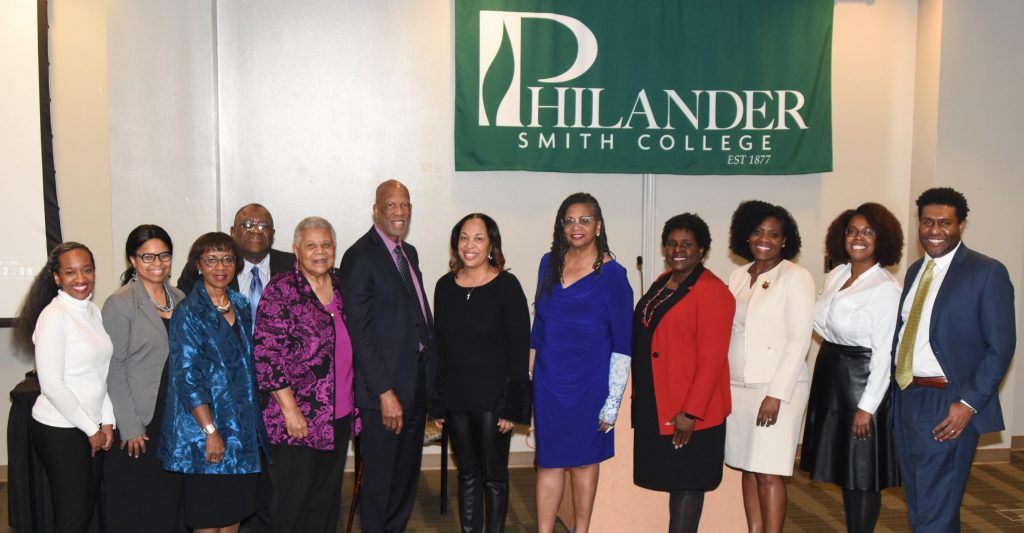
Other African American psychologists from Arkansas highlighted included Dr. Mamie Phipps Clark (1917–1983) of Hot Springs, principal investigator of the “Doll Study,” which formed the basis for the U.S. Supreme Court’s decision in Brown v. Board of Education; Dr. Robert L. Williams (1930–2020) of Little Rock, who was a graduate of Philander Smith College and professor emeritus at Washington University in St. Louis; and Dr. William Sterling Hall (1934–2019) of Lonoke, who was chairman of the Department of Psychology at the University of Maryland, College Park. The forum also recognized the first African Americans to receive PhDs from the University of Arkansas in Fayetteville as well as highlighted the contributions by Arkansas’s HBCUs (historically black colleges and universities) in preparing and training African Americans to become psychologists.
“It was a privilege for Arkansas to celebrate such a rich history in psychology. Little is known about the history of contributions made by African American psychologists from Arkansas. This was a historical milestone that we were pleased to celebrate.”
Patricia L. Griffen, PhD, Clinical Psychologist, Project Director
***
As part of this centennial recognition, the CALS Butler Center for Arkansas Studies facilitated the recording and archiving of five oral history interviews from 2018 to 2020 featuring African American psychologists from Arkansas.
Interview 1: Robert L. Williams, PhD—November 19, 2018, St. Louis, MO
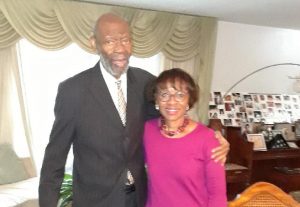
Dr. Robert L. Williams (1930–2020), professor emeritus of psychology and founding director of African and African-American Studies at Washington University in St. Louis, was the first licensed black psychologist in Arkansas. He graduated from Philander Smith College with honors although he had been encouraged in high school to attend a vocational school after scoring poorly on an IQ test. He went on to complete a PhD in clinical psychology from Washington University. He fought to improve racial and cultural inequities in the education of black children, developed the Black Intelligence Test of Cultural Homogeneity, authored numerous articles and books, and coined the term “Ebonics,” which he defined as African Americans’ linguistic memory of African languages. He is considered one of the most influential figures in African American psychology. In 2011, Dr. Williams was inducted into the Arkansas Black Hall of Fame. Dr. Williams was interviewed by Dr. Patricia L. Griffen. Read more about Robert L. Williams on the CALS Encyclopedia of Arkansas here.
Listen to the complete oral history recording
Interview 2: Terrence J. Roberts, PhD—January 24, 2019, CALS Butler Center, Little Rock, AR
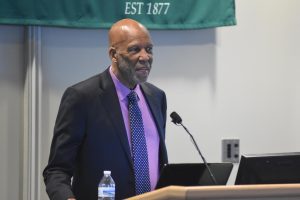
Dr. Terrence J. Roberts is one of the Little Rock Nine, the African American students who desegregated Central High School in 1957. Dr. Roberts is CEO of Terrence Roberts Consulting, a management consultant firm devoted to fair and equitable practices in business and industry. He received a bachelor’s degree in sociology from California State University, Los Angeles, a master’s in social welfare from the University of California at Los Angeles, and a PhD in psychology from Southern Illinois University in Carbondale. Dr. Roberts was a member of the faculty at Pacific Union College in Napa Valley, California. He has been director of mental health at St. Helena Hospital and Health Center, assistant dean in the UCLA School of Social Welfare, and faculty member of Antioch University in Los Angeles. In 2014, during the fiftieth anniversary of the 1964 Civil Rights Act, the Arkansas Psychological Association presented Dr. Roberts with the Civil Rights Award to recognize his status as an icon for the advancement of humanitarian causes and social justice. Dr. Roberts is the author of Lessons from Little Rock (Butler Center Books, 2009) and Simple, Not Easy: Reflections on Community, Social Responsibility and Tolerance (Parkhurst Brothers Publishers, 2010). Dr. Roberts was interviewed by Dr. Patricia L. Griffen. Read more about Terrence Roberts on the CALS EOA here.
Listen to the complete oral history recording
Interview 3 (two parts): William Sterling Hall, PhD—February 22, 2019, and March 24, 2019, Little Rock, AR
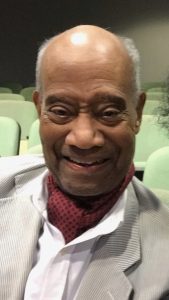
Dr. William S. Hall (1934–2019) was from Scott, Arkansas, and attended elementary schools in North Little Rock. He graduated from Scipio A. Jones High School and then earned a bachelor’s degree from Roosevelt University in Chicago in 1957. In 1968, he received a doctoral degree in psychology from the University of Chicago. Dr. Hall continued his education in the field of psychology and became a post-doctoral fellow, served as a visiting scholar, and held several professional faculty positions. Most notable were Vassar College, Princeton University, Rockefeller University, the University of Illinois at Urbana-Champaign, New York University, and the University of Maryland, College Park. Dr. Hall published widely in the areas of language and cognitive development, developmental neuroscience, and neuroanatomy in peer-reviewed journals, and he co-authored three books. Dr. Hall was interviewed by Mr. Cary Crawford, president of the AABPP, and Dr. Rachel Tennial, the first African American faculty member in the Department of Psychology at the University of Arkansas at Little Rock, currently a faculty member at Southern Illinois University in Carbondale.
Listen to the complete oral history recording (part 1)
Listen to the complete oral history recording (part 2)
Interview 4: Ms. Minnijean Brown Trickey—February 29, 2020, CALS Butler Center, Little Rock, AR
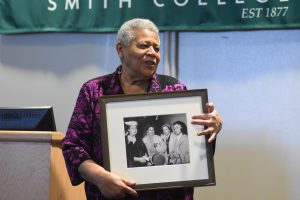
Ms. Minnijean Brown Trickey is one of the Little Rock Nine, the African American students who desegregated Central High School in 1957. After an incident at Central in which she retaliated against students who were harassing her, she was expelled by the governor from attending all schools in Arkansas. She lived with psychologist Dr. Mamie Phipps Clark, originally from Hot Springs, and her husband Dr. Kenneth Clark in Manhattan until she finished high school. She holds a bachelor of social work in native human services from Laurentian University and a master of social work from Carleton University in Ontario, Canada. She has lifelong experience in working with peacemaking and environmental issues, developing youth leadership and diversity education, and providing training in cross-cultural communication, gender, and social justice advocacy. Ms. Trickey’s teaching experience in social work includes Carleton University and community colleges in Canada. She served in the Clinton administration as Deputy Assistant Secretary for Workforce Diversity at the U.S. Department of the Interior and was the Shipley Visiting Writer for Heritage Studies at Arkansas State University in Jonesboro. She is a nonviolence and antiracism facilitator for Sojourn to the Past, a ten-day interactive history experience for high school students. Ms. Trickey was interviewed by Dr. Loretta McGregor, professor of psychology, former department chairperson, and past president of the Faculty Senate at Arkansas State University. Read more about Minnijean Brown Trickey on the CALS EOA here.
Listen to the complete oral history recording
Interview 5: Patricia L. Griffen, PhD, Harriette Richard, PhD, and Robbie Bush, PhD; First African American PhD graduates in psychology from the University of Arkansas—February 29, 2020, CALS Butler Center, Little Rock, AR
 Dr. Patricia L. Griffen was the first African American to receive a PhD in clinical psychology from the University of Arkansas. She is a clinical psychologist and CEO with Clinical Psychology Services, Inc., a private practice she established. Dr. Griffen was a Ford Fellow and upon completion of the PhD joined the faculty in the Department of Psychology at the University of Arkansas. She has held faculty appointments in Departments of Psychology at El Paso Community College in Colorado Springs, Colorado, and the University of Arkansas at Little Rock (adjunct), and more recently was chairperson of the Department of Psychology at Philander Smith College. Dr. Griffen served as president of the Arkansas Psychological Association and president of the AABPP, and was appointed and served a five-year term on the Arkansas Board of Examiners in Psychology.
Dr. Patricia L. Griffen was the first African American to receive a PhD in clinical psychology from the University of Arkansas. She is a clinical psychologist and CEO with Clinical Psychology Services, Inc., a private practice she established. Dr. Griffen was a Ford Fellow and upon completion of the PhD joined the faculty in the Department of Psychology at the University of Arkansas. She has held faculty appointments in Departments of Psychology at El Paso Community College in Colorado Springs, Colorado, and the University of Arkansas at Little Rock (adjunct), and more recently was chairperson of the Department of Psychology at Philander Smith College. Dr. Griffen served as president of the Arkansas Psychological Association and president of the AABPP, and was appointed and served a five-year term on the Arkansas Board of Examiners in Psychology.
 Dr. Harriette Richard was the first African American to receive a PhD in applied experimental psychology from the University of Arkansas. She is associate professor of psychology at Johnson C. Smith University in Charlotte, North Carolina. Dr. Richard was associate professor of psychology at the University of North Georgia, assistant professor of psychology at Northern Kentucky University, and psychology coordinator and professor at Columbia College in Chicago. Dr. Richard has been the recipient of various fellowships, awards, and honors, including Fulbright Scholar Post-Apartheid South Africa, Salzburg Fellow, and Senior Scholar at Auburn University and New York University Faculty Resource Network. She has been a consultant and reviewer for American Psychologist, Hero Grant Award Group, and Wake Forest University’s Maya Angelou Center.
Dr. Harriette Richard was the first African American to receive a PhD in applied experimental psychology from the University of Arkansas. She is associate professor of psychology at Johnson C. Smith University in Charlotte, North Carolina. Dr. Richard was associate professor of psychology at the University of North Georgia, assistant professor of psychology at Northern Kentucky University, and psychology coordinator and professor at Columbia College in Chicago. Dr. Richard has been the recipient of various fellowships, awards, and honors, including Fulbright Scholar Post-Apartheid South Africa, Salzburg Fellow, and Senior Scholar at Auburn University and New York University Faculty Resource Network. She has been a consultant and reviewer for American Psychologist, Hero Grant Award Group, and Wake Forest University’s Maya Angelou Center.
 Dr. Robbie Bush was the first African American man to receive a PhD in clinical psychology from the University of Arkansas. He graduated magna cum laude from Philander Smith College with a bachelor’s in psychology and completed a master’s in social psychology from the University of Missouri–Kansas City. He has worked for state government as a psychologist in Arkansas, Illinois, and New York and has more than thirty years of experience. Dr. Bush held positions in psychology at the Arkansas State Hospital, Arkansas State School for the Blind, Arkansas Department of Corrections, Illinois Department of Mental Health, Chicago-Read Psychiatric Hospital, and the New York State Office of Mental Health. During retirement, Dr. Bush has served as adjunct professor of psychology at Philander Smith College and is a member of the AABPP.
Dr. Robbie Bush was the first African American man to receive a PhD in clinical psychology from the University of Arkansas. He graduated magna cum laude from Philander Smith College with a bachelor’s in psychology and completed a master’s in social psychology from the University of Missouri–Kansas City. He has worked for state government as a psychologist in Arkansas, Illinois, and New York and has more than thirty years of experience. Dr. Bush held positions in psychology at the Arkansas State Hospital, Arkansas State School for the Blind, Arkansas Department of Corrections, Illinois Department of Mental Health, Chicago-Read Psychiatric Hospital, and the New York State Office of Mental Health. During retirement, Dr. Bush has served as adjunct professor of psychology at Philander Smith College and is a member of the AABPP.
This interview was conducted by Dr. Rachel Tennial.
Listen to the complete oral history recording
About the Arkansas Association of Black Psychology Professionals (AABPP)
The mission of the Arkansas Association of Black Psychology Professionals is to promote the mental health of the black community through education, social change and advocacy and professional development of black psychology professionals.
The AABPP is a relatively young organization, with only a ten-year history. Arkansas has only recently experienced an increase in the number of black psychologists practicing in the state. For years, African Americans left Arkansas for graduate studies in psychology and chose to pursue career opportunities elsewhere. Arkansas currently has its first generation of black psychologists in most areas of practice.
By Dr. Patricia Griffen; centennial celebration photos by Roger Robinson, Quality Video Services




